eCommerce: Indonesia
eCommerce in Indonesia: Market to Reach US$100 Billion Soon
Online shopping in Indonesia is thriving, with a surge in eCommerce activity. Explore how trends are reshaping consumer behavior in Indonesia.
Article by Cihan Uzunoglu | May 03, 2024
eCommerce in Indonesia: Key Insights
Online Spending Dominance:
Indonesia's online spending makes up 64% of its total consumer spending, highlighting a major shift towards digital, spurred by broader internet access and increased digital literacy.
Revenue Growth Forecast:
The country's eCommerce revenue is expected to see substantial growth, potentially reaching US$120 billion by next year.
Weekly Shopping Habit:
More than a third of Indonesians engage in online shopping on a weekly basis, embedding eCommerce deeply into daily life and pointing to opportunities for market expansion, especially given the minimal number of consumers who do not shop online at all.
Livestream Commerce Surge:
In Indonesia, 69% of consumers participated in livestream commerce in 2022, mainly through eCommerce platforms.
Regulatory Challenges:
The Indonesian government has banned direct transactions on social media platforms like TikTok Shop, which could dampen social commerce. However, TikTok's strategic acquisition attempts with Tokopedia suggest a possible countermeasure to these new regulations.
Indonesia, as of 2023, is the world's fourth most populous country, home to over 270 million people and a rapidly urbanizing society with a total number of internet users of over 230 million. The Southeast Asian archipelago consists of more than 17,000 islands, has over 700 local languages, and a predominantly digital-savvy, young population.
With an anticipated revenue exceeding US$100 billion by 2025, the country's eCommerce market is projected to swell to over US$200 billion by 2028 according to our numbers. This growth is made possible and nurtured by various factors in the country, some of which we'll have a brief look at here.
Consumer Spending in Indonesia: 64% Online
Indonesia is a significant player in the APAC region. According to a 2022 report by Wunderman Thompson Commerce, Indonesia's online spending accounted for a significant 64% of the country's total consumer spending, aligning it with India and just trailing China, which led the pack at 66%.
Moreover, Indonesia's performance surpasses other countries like Thailand, Australia, and Japan, which reported online spending rates of 60%, 55%, and 48%, respectively.
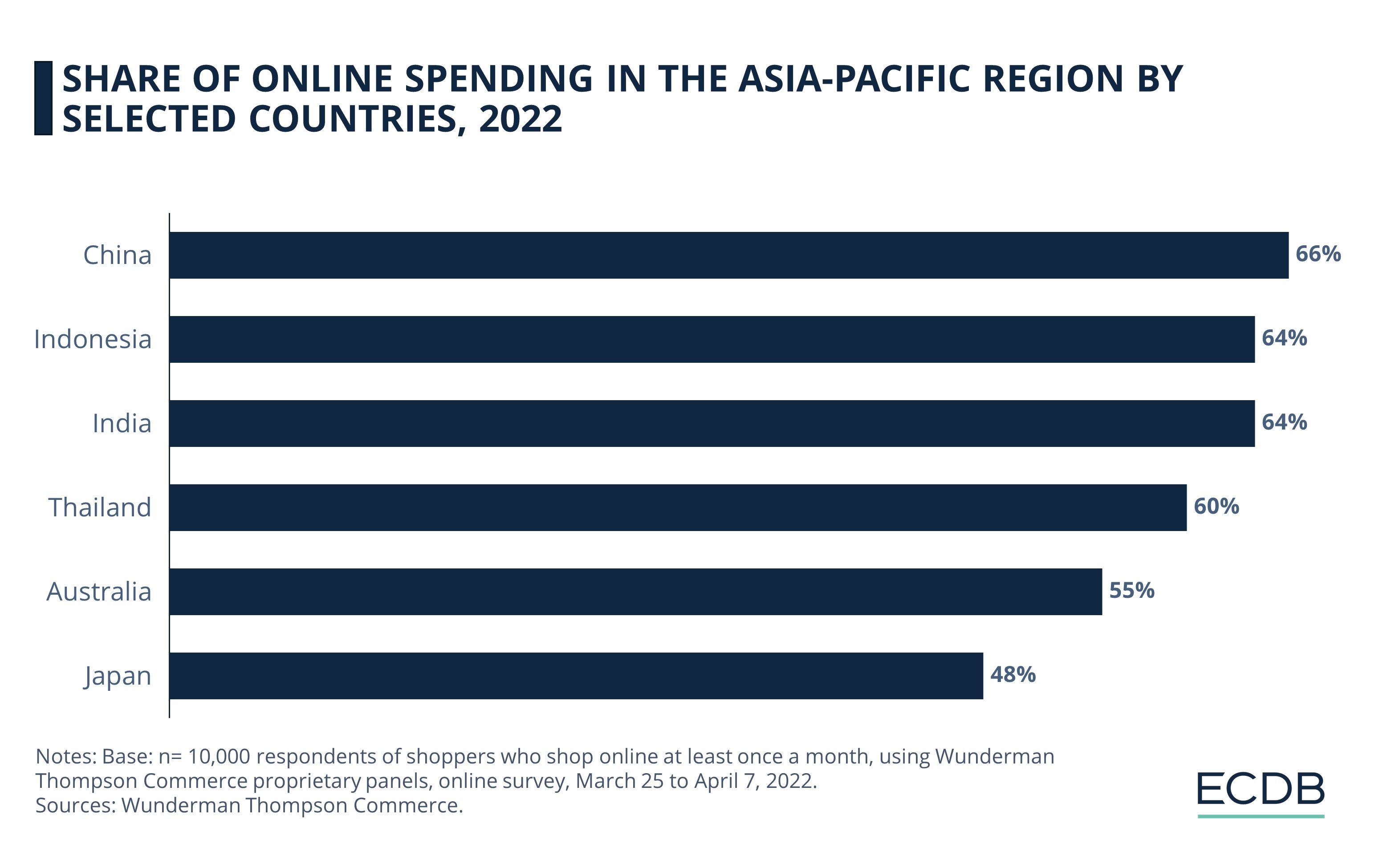
Indonesia's high online spending percentage stems from multiple factors. The country's rapid digital transformation, fueled by widespread internet access via mobile phones, has driven a shift towards online shopping. With the fourth-largest global population, Indonesia's growing internet penetration naturally increases online transactions.
Indonesia’s eCommerce Penetration Rate Grows
In general, there is a high probability of a positive correlation between Internet penetration and eCommerce penetration rate. As more people gain internet access and develop digital literacy, the customer base for eCommerce grows, potentially increasing the country's penetration rate.
Back in 2019, Indonesia's eCommerce penetration rate was only 23%, and by 2023 it grew to 32%. As projections indicate, this increase is set to continue, pushing the rate to an estimated 46% by 2028.
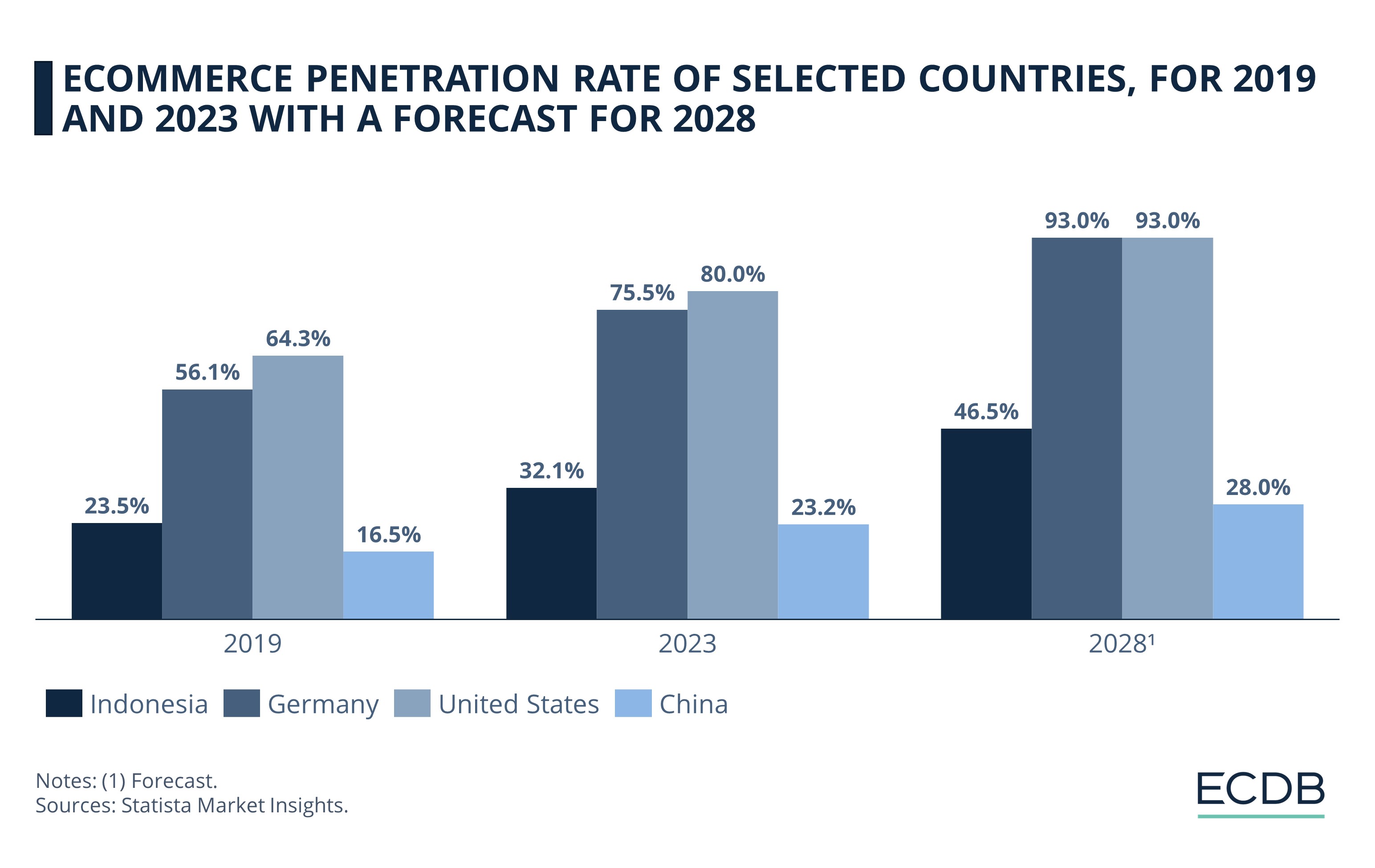
This expansion reflects the nation's burgeoning digital literacy, even though countries like Germany and the United States are way ahead with values twice as high as the Indonesian eCommerce penetration rate, each forecast at 93% by the year 2028. Meanwhile, China remains behind and is expected to reach a 28% rate by 2028.

Indonesian eCommerce Market: US$120 Billion by Next Year?
As internet access expands and digital skills improve, more people are shopping online, boosting the potential for eCommerce revenue in Indonesia.
Looking at recent data, we see a significant jump in revenue from 2019 (nearly US$25 billion) to 2020 (US$49 billion), largely driven by the COVID-19 pandemic's boost to online shopping. After this surge, growth has continued at a steadier pace. For instance, revenue moved up from US$53 billion in 2021 to US$59 billion in 2022, following with almost US$73 billion last year.
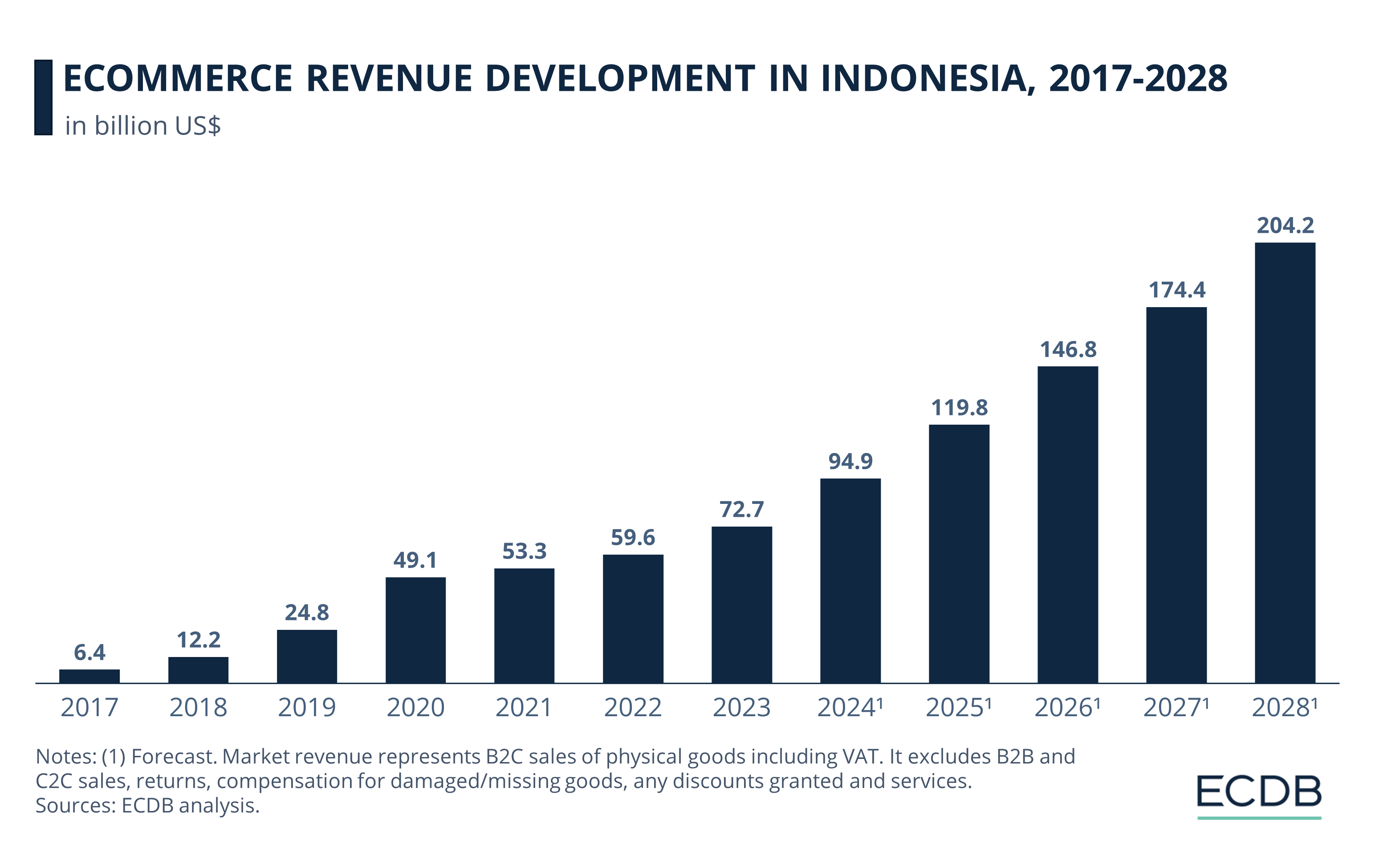
Forecasts for upcoming years are even more optimistic. Revenue is expected to hit US$95 billion this year and continue its upward trajectory, reaching US$120 billion in 2025, US$147 billion in 2026, and further climbing to US$174 billion by 2027. By 2028, eCommerce revenue in Indonesia is projected to exceed US$204 billion, showcasing a substantial growth from the figures recorded in recent years.
More Than a Third of Indonesians Shop Online Weekly
The Indonesian eCommerce market is characterized by consumer engagement that isn't simply episodic, but rather habitual.
The 2023 data from Rakuten Insight showcases the online shopping frequency among consumers in Indonesia. The majority (37%) shops weekly, followed closely behind by 36% who shop several times a week, and 15% shopping less than once a week. Less frequently, 10% shop almost every day, and a mere 2% never shop online.
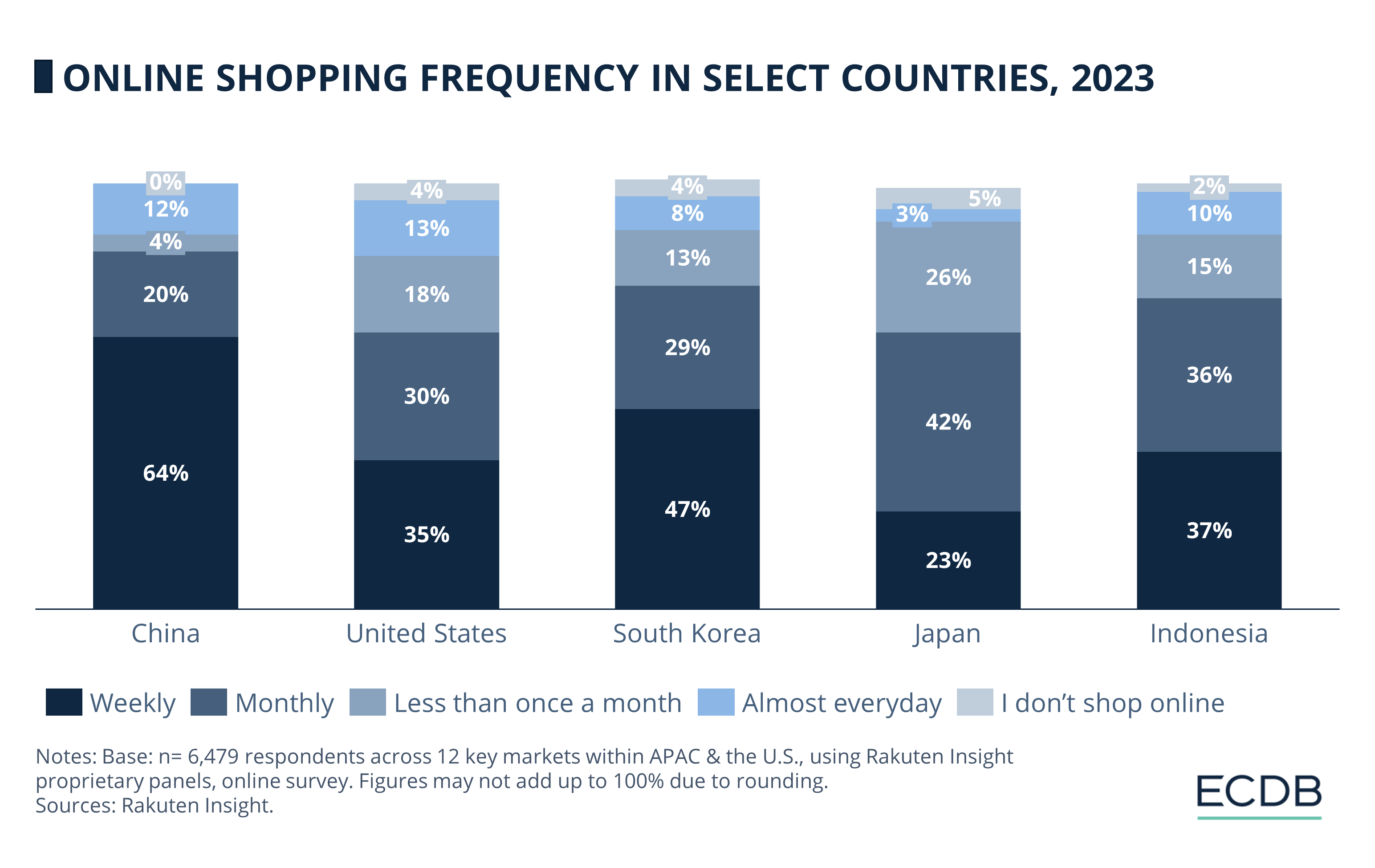
Comparative data provides a better context. It's worth noting that Indonesia has a relatively low percentage of consumers who never shop online. While this share is around 0% in China, it is 4% in both the U.S. and South Korea, and 5% in Japan. With 10%, Indonesia is just behind the world leaders China (12%) and the U.S. (13%) in terms of (almost) daily online shoppers.
This trend in Indonesia reflects a persistent demand that businesses can seize for their benefit. Additionally, the small fraction of consumers who never partake in online shopping suggests there is still substantial room for market growth.
Livestream Commerce in Indonesia
One of the latest developments in the eCommerce landscape is the emergence of livestream commerce which originated in China. Livestream commerce, or live shopping, is essentially a hybrid of entertainment and eCommerce.
It involves the use of livestream video content to showcase and sell products directly to consumers in real-time, with the ability to interact with sellers and make purchases immediately, combining the thrill of live video and social media engagement with the convenience of online shopping.
In the case of Indonesia, where this digital trend has gained popularity in the online shopping sphere, the data shows that the country is a strong adopter of livestream commerce within the APAC region.
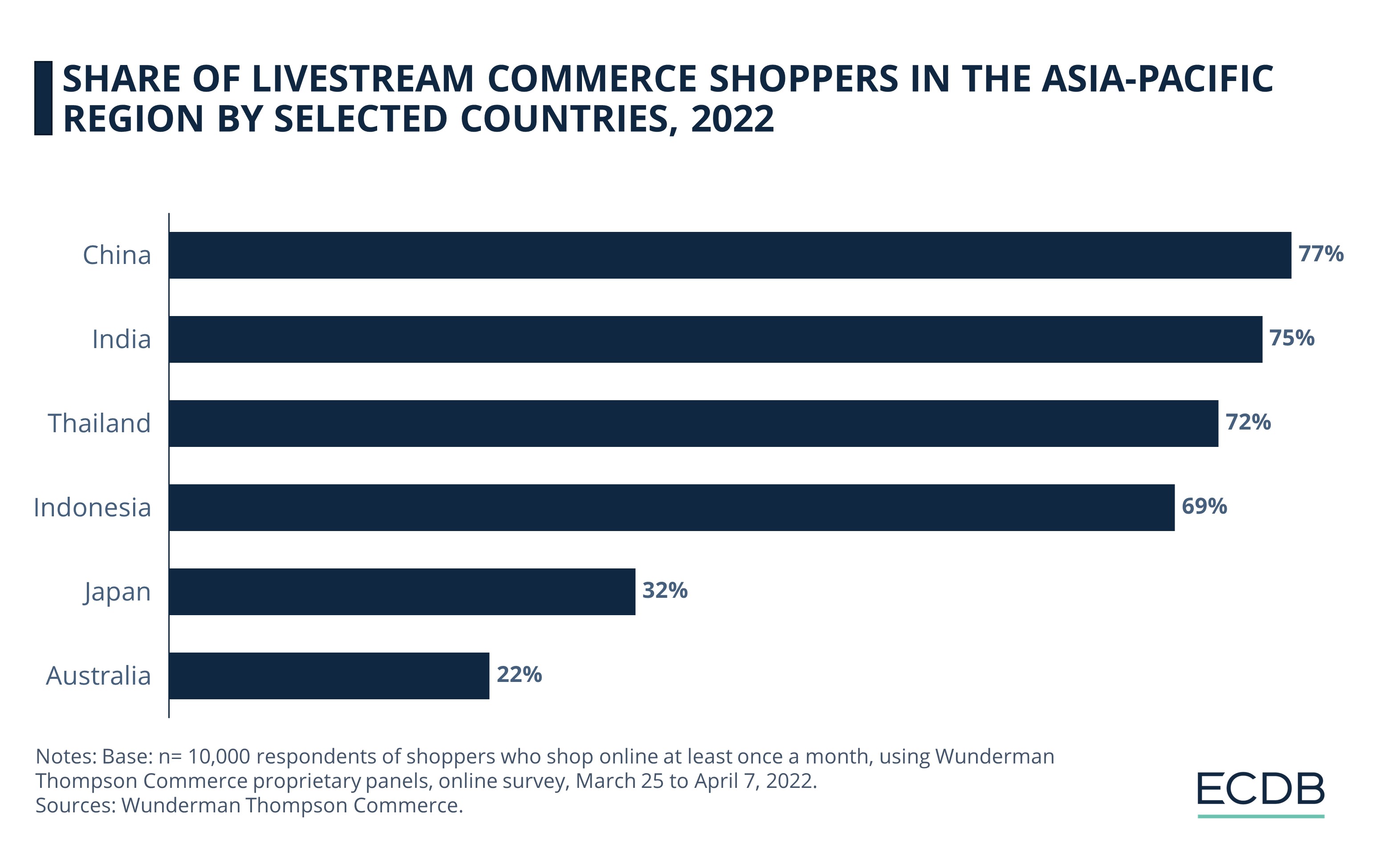
As per the forementioned report by Wunderman Thompson Commerce, 69% of Indonesian shoppers engage with livestream commerce in 2022, marking a significant adoption rate. This, however, still places Indonesia slightly behind China, India, and Thailand, which report rates of 77%, 75%, and 72% respectively. Meanwhile, Japan and Australia trail behind with respective livestream commerce adoption rates of 32% and 22%.
Indonesia Prefers eCommerce Platforms for Live Shopping
Indonesia's recognition of the growing livestream commerce trend has been evident in the proactive steps taken by its eCommerce platforms, like Shopee. The Singapore based eCommerce platform has integrated livestream commerce into their marketing strategies by creating Shopee Live, effectively employing this potent tool to stimulate sales growth and enhance customer engagement. The adoption, however, extends beyond businesses — it's being wholeheartedly embraced by consumers as well.
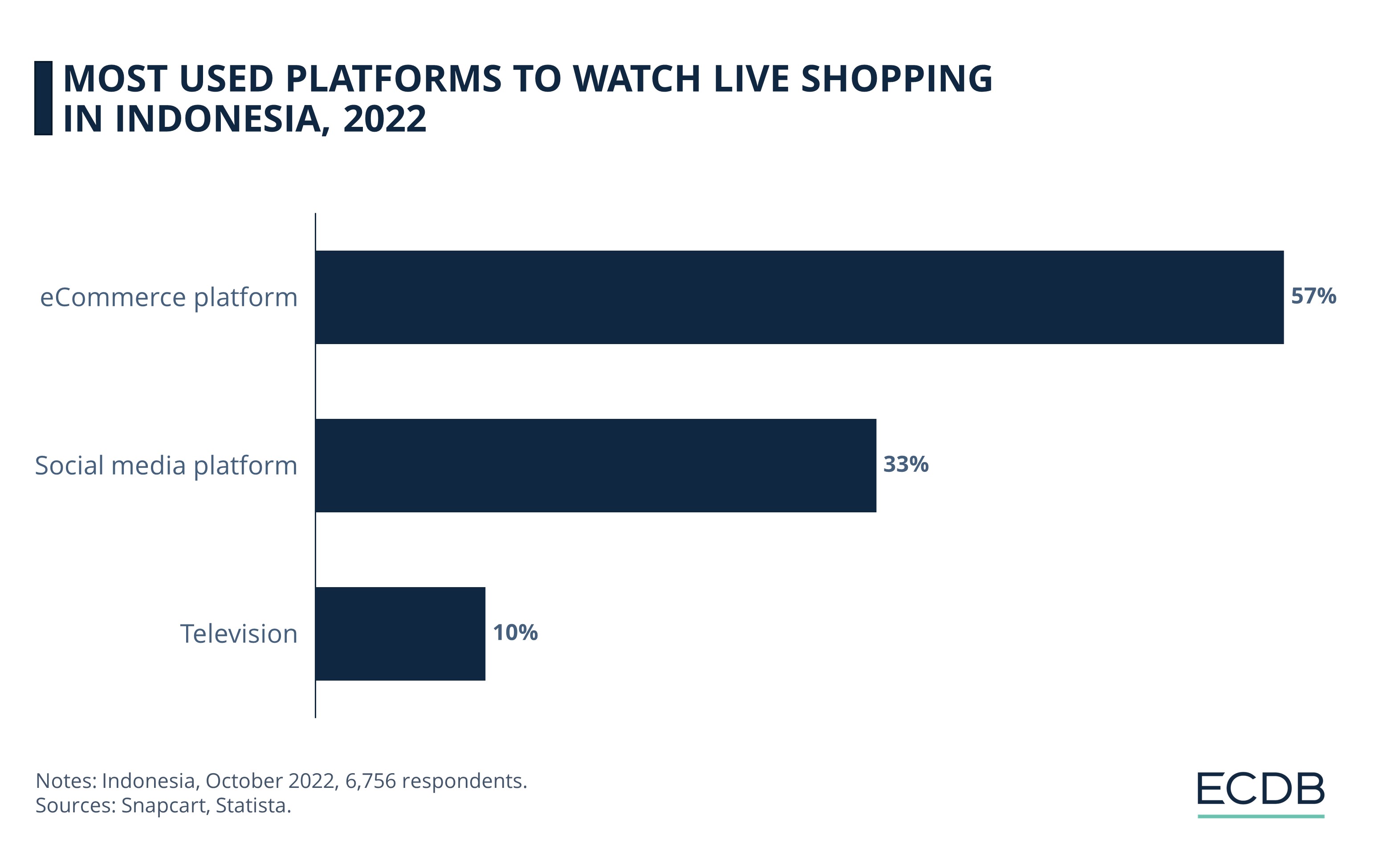
A 2022 survey conducted by Snapcart revealed that a significant 57% of Indonesian participants engage in live shopping, primarily through eCommerce platforms. Although social media platforms captured a substantial share with one-third of the responses, the traditional medium TV stood at a mere 10%.
Indonesian Government Against
Social Commerce
Considering the ban of direct transactions on social media by the Indonesian government in September 2023, however, it is probable that social commerce in the country might lose some ground.
The sanction specifically targets TikTok's sales platform, the TikTok Shop, as it grew so quickly and created a monopoly in the Southeast Asian region that the government was forced to intervene. Even though the new regulation obligated TikTok Shop to close in Indonesia, TikTok is working on buying 75% of Goto’s Tokopedia, the biggest Indonesian eCommerce platform. This may be a tactic to overcome government protectionism and regain ground in what was once TikTok Shop's largest market.
The U.S. president Joe Biden recently signed a bill requiring TikTok's parent company, ByteDance, to sell its stake within a year or face a U.S. ban.
The exact plans of the Chinese company are still unclear, and it remains to be seen whether Indonesia will manage to maintain the separation of social media and eCommerce or whether social commerce will be able to celebrate a comeback in 2024.
Sources: Wunderman Thompson Commerce, Rakuten Insight, Snapcart, Statista, ECDB
Related insights
Article
German Drugstore CEO Calls for Legislative Action Against Temu
German Drugstore CEO Calls for Legislative Action Against Temu
Article
Amazon GMV: Which Domains Grew the Fastest?
Amazon GMV: Which Domains Grew the Fastest?
Article
Top Marketplaces in Southeast Asia 2024: Can Shopee Dominate the Region?
Top Marketplaces in Southeast Asia 2024: Can Shopee Dominate the Region?
Article
Zalando, Otto & About You: Revenue, Market Growth, Business Strategies
Zalando, Otto & About You: Revenue, Market Growth, Business Strategies
Article
Is Temu a Threat to Amazon, Zalando & Otto?
Is Temu a Threat to Amazon, Zalando & Otto?
Back to main topics